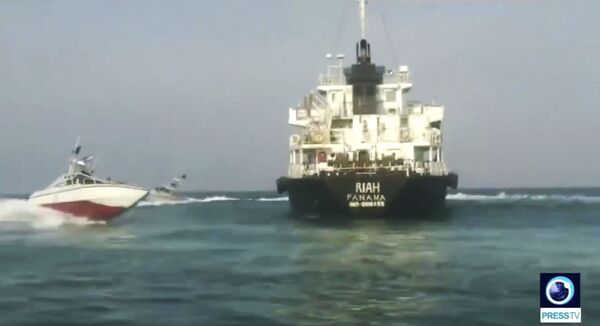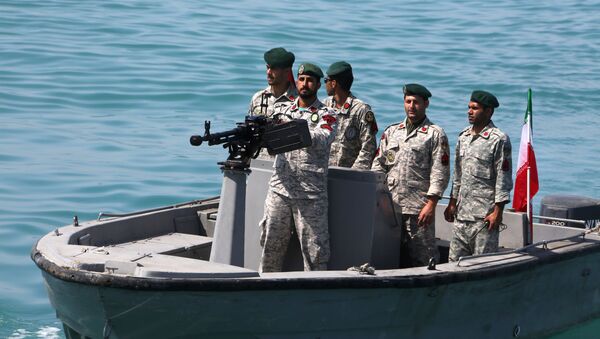Iranian Revolutionary Guard Corps forces have detained a foreign tanker along with 12 crewmembers south of Larak Island in the Persian Gulf over suspicions that it was smuggling one million litres of oil, Fars News Agency reported. There has so far been no information about the tanker's name or the country it belongs to.
The YJC news agency reported later, citing an anonymous source, that the detained vessel was sailing under a UK flag. The source also added that the UK and US wanted the ship to be registered as belonging to the UAE, which recently denied losing contact with any of its tankers, as they want to avoid an escalation of tensions in the region. The UK, however, denied the report, stating that the detained tanker was not sailing under the British flag.

Iran’s IRIB broadcaster reported that the detained tanker was flying a Panamanian flag, while footage shown by PressTV showed the tanker's name, Riah, with word "Panama" written under.
According to the Tasnim News Agency, citing an IRGC spokesperson, the ship was stopped by the Iranian forces on 14 July and was detained after they confirmed it was carrying contraband oil. Reuters reported, citing a local TV, that the detained vessel was the one that sent a distress call on Sunday. The tanker was reportedly transporting oil from Iranian smugglers to buyers abroad.
"The vessel that Iran towed to its waters after receiving a distress call, was later seized with the order from a court as we found out that it was smuggling fuel", the IRGC spokesman said in a statement on state TV.
International Reaction
The UK, which currently has strained relations with Iran, was quick to react to the news, saying that it is trying to find additional information on the tanker's arrest, Reuters reported. A government spokesperson has called on Iran to take steps to ease the situation in the region.
"We continue to urge the Iranian authorities to de-escalate the situation in the region. We are continuously monitoring the security situation there and are committed to maintaining freedom of navigation, in accordance with international law", the British government's spokesperson said.
The US State Department spokesperson demanded that Iran immediately release the detained vessel, along with its crewmembers.
"The United States strongly condemns the Islamic Revolutionary Guard Corps Navy’s continued harassment of vessels and interference with safe passage in and around the Strait of Hormuz", the spokesperson wrote in a response to Reuters.
On the same day, US Central Command chief General Kenneth McKenzie announced during a joint press conference with Saudi General Prince Fahd bin Turki that he would be working "aggressively" to ensure the freedom of navigation in the Persian Gulf and that he has been contacting other countries on the matter. When asked about participating in the initiative, Prince Fahd stated that the country has already organised a military escort for its ships in the Red Sea.
The Iranian Foreign Ministry stated on 16 July that the country's forces had approached an international oil tanker that requested assistance due to experiencing a technical fault. The oil tanker was then tugged to Iranian waters to conduct the necessary repairs, the ministry added.
The statement came in the wake of the US voicing suspicions that Tehran could have seized a United Arab Emirates-based oil tanker that had turned off its tracker on 14 July, when sailing through the Strait of Hormuz.

The situation in the Gulf has escalated since British authorities seized an Iranian tanker in Gibraltar on 4 July over a tip from the US claiming that it was carrying oil bound for Syria in violation of European sanctions. Tehran slammed the arrest and denied sending oil to Syria. The Islamic Republic accused London of endangering international shipments and demanded the release of the vessel.
Tehran also warned it could seize British ships if its demands are not met, prompting the Royal Navy to start escorting UK ships in the Gulf and sending additional military vessels to the region.


